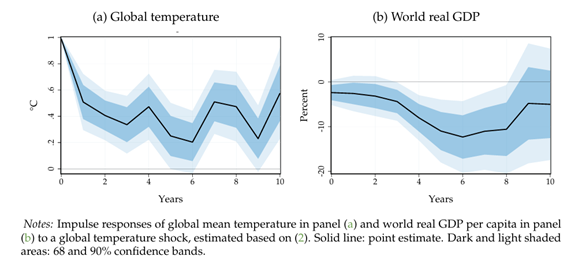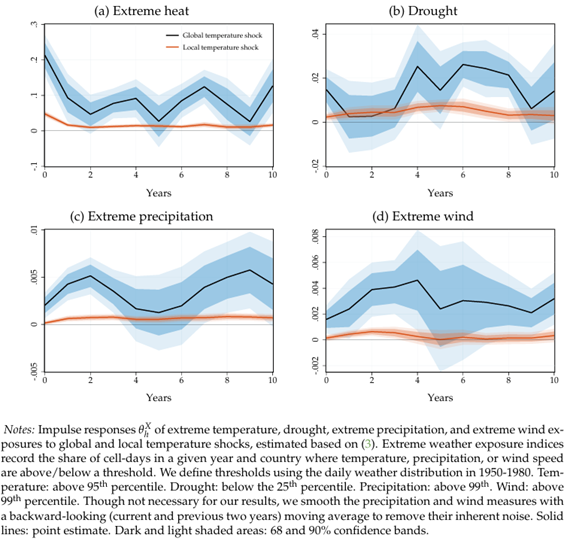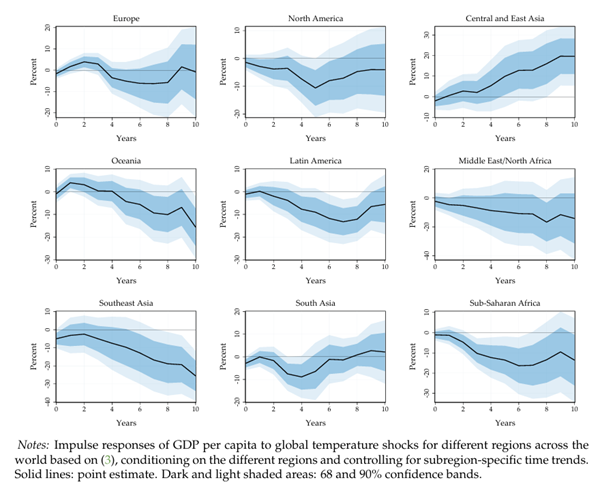A recent study by the National Bureau of Economic Research (NBER) reveals figures to watch out for on the economic impacts of climate change. According to the research, a 1°C rise in global temperature could reduce global GDP by 12%, a drop six times larger than estimated in previous studies. This figure underlines the magnitude of the climate crisis, which until now has not been fully understood in terms of its economic impact.
The report, led by Adrien Bilal of Harvard University and Diego Känzig of Northwestern University, highlights that global climate change affects economies not only locally, but triggers extreme weather events worldwide. These events, such as heat waves, prolonged droughts, severe storms and heavy precipitation, generate huge capital losses, lower productivity and profoundly affect investment in the most affected countries. The authors of the study point out that more than 66% of the negative effects of climate change are due to these extreme events.
Graph on the impact of global temperature rise on world GDP

Source: National Bureau of Economic Research (NBER)
In addition, the study introduces a critical fact into the debate on decarbonisation policies: the social cost of carbon (SCC). According to the authors, the social cost of carbon has been underestimated for decades. They now estimate it to be around $1,065 per tonne of CO2 emitted, a figure drastically higher than most current estimates, which hover around $185 per tonne. This increase implies that emissions reduction policies are much more cost-effective and necessary than previously thought, especially for large economies such as the United States, which could benefit economically from unilateral decarbonisation measures.
Extreme events
Climate change, more than just an increase in temperature, is closely linked to the intensification of extreme weather events. According to the study, a 1°C increase in global temperature could double the frequency of extreme heat waves and increase the probability of extreme wind and precipitation events by 50%. These phenomena are directly responsible for the destruction of infrastructure, reduced agricultural production and loss of human life, resulting in a significant drag on economic growth.
Graph on the increase in the frequency of extreme weather events

Source: National Bureau of Economic Research (NBER)
Inequality of effects
While the impact of climate change is global, not all countries will suffer equally. The warmest and lowest income countries, such as those in Southeast Asia and Sub-Saharan Africa, will experience the largest drops in GDP, with losses of up to 20%. These regions, which rely heavily on vulnerable sectors such as agriculture and lack the resources to adapt to extreme climate changes, will be particularly hard hit. However, the impact is not unique to these regions: the study notes that even advanced economies, such as the United States and Europe, will suffer significant drops in GDP due to rising global temperatures.
Heat map showing inequality in the effects of global warming by region

Source: National Bureau of Economic Research (NBER)
The need for urgent decarbonisation policies
The study not only warns of the devastating effects of climate change on the global economy, but also provides a compelling assessment of the economic efficiency of reducing carbon emissions.
With such a high SCC, decarbonisation policies – such as investment in renewable energy, transport electrification and energy efficiency – are not only feasible but also economically essential. These policies become extremely cost-effective compared to the damage they could prevent. This means that any government that invests in reducing its emissions will be preventing much larger economic losses in the future, even if that investment seems costly in the short term.
One of the most important findings of the report is that, thanks to the reassessment of the SCC, countries like the United States could benefit from emission reduction policies without the need for other countries to take similar actions. The concept of ‘Domestic Carbon Cost’ (DCC), which measures benefits only to the country itself, has risen from $45 to $213 per tonne for the US, implying that even in the absence of a global agreement, unilateral carbon reduction measures are economically cost-effective.
In this context, the study concludes that the cost of inaction could be much higher than that of implementing aggressive decarbonisation policies. It is estimated that, by 2100, if no action is taken, the global economy could face a 47% decline in capital and consumption, leading to a welfare loss equivalent to 29% of current global wealth.
At Laragon/ALL4, we understand that the transition to a low-carbon economy is both a challenge and an opportunity. With our integrated ESG reporting and environmental management solutions, we help companies reduce their carbon footprint, comply with increasingly stringent regulations and reap the economic benefits of sustainability. At a time when the effects of climate change are more evident than ever, we accompany our clients in developing strategies that not only protect the planet, but also strengthen their long-term competitiveness and economic resilience.
Cover image: Image by vecstock on Freepik



